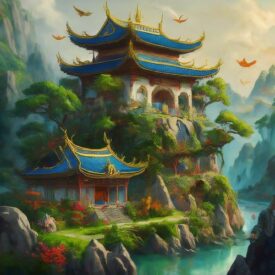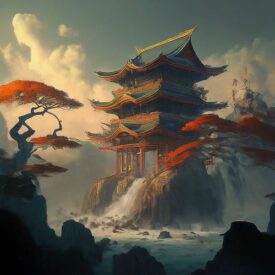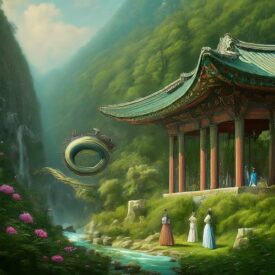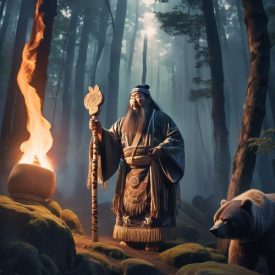East Asian Mythology
East Asian mythology is a vast and intricate tapestry of beliefs, deities, and folklore that stretches across cultures such as Japanese, Korean, Chinese, and Ainu. Each tradition offers a unique perspective on the relationship between humans, nature, and the divine, while also sharing themes of balance, transformation, and cosmic order. Unlike many mythological systems that focus solely on gods and heroes, it blends spirituality with everyday life, influencing customs, festivals, and cultural identity. Its stories reveal not only the origins of the world but also timeless values like harmony, respect for ancestors, and reverence for natural forces.
Chinese mythology lies at the core of East Asian mythology, with a pantheon that includes the Jade Emperor, Nuwa the creator goddess, and Sun Wukong, the Monkey King, whose adventures are immortalized in Journey to the West. The myths emphasize balance between yin and yang, the heavenly mandate, and the cyclical nature of time. Korean mythology complements this with tales of Dangun, the legendary founder of Korea, as well as mountain spirits and guardian deities deeply tied to nature and the land. These stories reflect a strong link between humans and the natural world, showing how mythology served as both a spiritual and social guide.
Japanese mythology, recorded in texts like the Kojiki and Nihon Shoki, features gods such as Amaterasu, the sun goddess, Susanoo, the storm deity, and Tsukuyomi, the moon god. These kami embody natural forces and human emotions, with myths often blending themes of conflict, reconciliation, and renewal. Shinto practices and Buddhist influences further shaped these stories, making Japanese mythology central to cultural life and rituals. Ainu mythology, meanwhile, focuses on kamuy (spirits) inhabiting animals, landscapes, and daily life, with the bear revered as one of the most sacred beings. This belief system highlights the intimate relationship between myth and survival in harsh natural environments.
Together, these traditions form the foundation of East Asian mythology, a cultural force that continues to shape literature, art, and modern popular culture. From Chinese dragon festivals and Japanese Shinto ceremonies to Korean folktales and Ainu rituals, the myths remain alive through cultural expression and storytelling. It also influences contemporary media, from anime and films to video games and novels, ensuring that these ancient traditions resonate with new audiences. By exploring East Asian mythology, one discovers a shared yet diverse heritage where gods, spirits, and heroes embody the values and imagination of entire civilizations.





